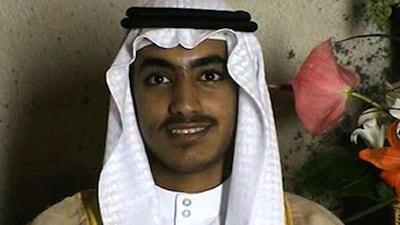Hamza bin Laden, son of former Al Qaeda leader Osama, is dead, according to media reports quoting US officials.
The US has obtained intelligence that suggests he is no longer alive, officials told NBC News. While the NBC report did not mention the time or circumstances of Hamza's death, the New York Times subsequently quoted two officials as saying it was the result of an operation in which the US was involved and had taken place in the past two years.
US President Donald Trump refused to comment when questioned by reporters.
Hamza was widely believed to be the heir to his father, one of the architects of the 9/11 terror attacks in New York City. Osama was killed in a US Navy Seals raid in Pakistan in 2011.
Since then, Hamza released audio and video messages vowing revenge and calling for attacks on the US, Russia, Europe and Saudi Arabia. The last statement was in 2018.
Hamza bin Laden was born in 1989 and he is believed to have married the daughter of Al Qaeda senior leader Abdullah Ahmed Abdullah, the FBI's official website says.
Abdullah's name in Al Qaeda is Abu Muhammad Al Masri and he has been indicted by the US government for involvement in the bombings of US embassies in Tanzania and Kenya in 1998.
The FBI said Hamza had “ties to, and may be located in, Afghanistan, Pakistan, Syria or Iran.”
This year the State Department announced a $1 million (Dh3.6m) reward for any information leading to him.
But experts who spoke to The National had their doubts about the effect the young bin Laden's death would have on Al Qaeda.
"Al Qaeda has been pushing Hamza bin Laden aggressively a few years now but there isn't a lot of evidence that he was catching on," said J M Berger, author of Extremism and a fellow at Vox Pol.
Mr Berger told The National that if the reports were true: "It is not clear that it will have much impact on the group beyond providing a martyrdom talking point."
Aaron Zelin, a senior fellow at the Washington Institute for Near East Policy, also underplayed the effect of Hamza’s death on Al Qaeda’s strength.
“It is noteworthy because of the bin Laden name,” Mr Zelin said.
But he said reports portraying Hamza as “if he would supercharge Al Qaeda again and would be some charismatic leader are overblown".
"I'm sure if it is true, there'll be martyrdom condolence statements by the various groups affiliated with Al Qaeda," Mr Zelin said.
But in terms of impact on Al Qaeda operations: “I doubt this will move the needle much."
Cole Bunzel, a research fellow at Yale University, said if the reports on his death were confirmed and that Hamza was being groomed as successor to Ayman Zawahiri: "We likely won’t see a bin Laden at the helm of Al Qaeda in the foreseeable future.”
Hamza was the most public face in his family after his father’s death.
Mr Bunzel said Hamza “was intimately involved in Al Qaeda media”, but there is less evidence on his role in operations.
And even in public sphere, Mr Bunzel had doubts on Hamza ever being a key figure in the terrorist group.
“His speeches seemed to attract only limited attention,” he added.
Meanwhile on Thursday, Philippines officials said a Jordanian man who was a "former henchman" of the bin Laden family was arrested on the island of Mindanao in July.
Mahmoud Afif Abdeljalil, an alleged Al Qaeda financier and henchman of Osama's brother-in-law, was detained on July 4 in the coastal city of Zamboanga.
“We are going to deport him for being an illegal entrant as he has no record of arrival, after he was arrested and deported in 2003 for being an undesirable alien,” Jaime Morente, the chief of the Philippines Bureau of Immigration, said in a statement.
He remains in government custody.

